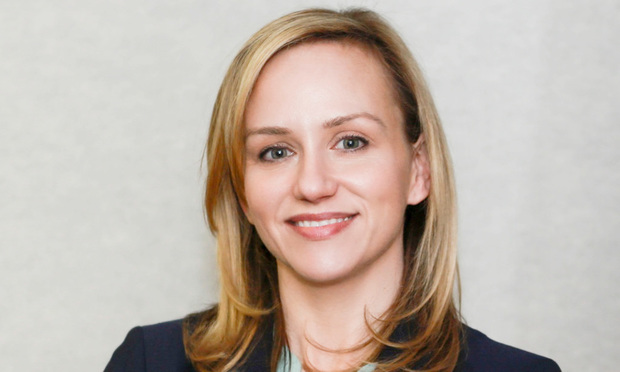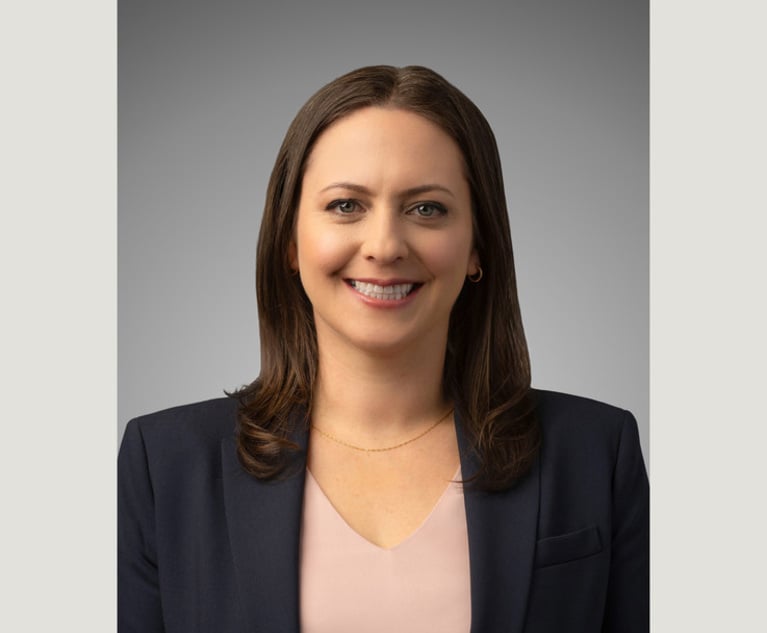Covington Hires 11-Year Veteran of SDNY US Attorney's Office
Amanda Kramer prosecuted many high profile defendants, including Anthony Weiner, the former Democratic Congressman whom Covington defended.
September 11, 2019 at 05:14 PM
5 minute read
 Amanda Kramer of Covington & Burling.
Amanda Kramer of Covington & Burling.
Amanda Kramer, a longtime assistant U.S. attorney in Manhattan who has prosecuted a range of high-profile fraud and sex-crime defendants, including Anthony Weiner, has joined Covington & Burling in New York as a partner.
Kramer's return to private practice—she'd previously been an associate at Weil, Gotshal & Manges—comes after about 11 years in the Southern District on New York U.S. Attorney's office, where she prosecuted human trafficking, financial crimes such as health care and mortgage fraud and other serious offenses. She was most recently a senior member of the Securities and Commodities Fraud Task Force.
Kramer said she didn't initially expect to spend so long in government, but "didn't feel ready to leave" until her departure this summer. She said Covington was at the top of her mind when looking at her post-government options, noting she knew and respected partners at the firm including Arlo Devlin-Brown, an SDNY alum who led the public corruption unit, and Nancy Kestenbaum, who co-chairs Covington's white-collar practice.
One of her most prominent convictions was that of Anthony Weiner, the former Democratic Congressman and onetime New York City mayoral hopeful whom Covington's Devlin-Brown defended. Weiner admitted to sexting with a minor. He was sentenced to 21 months behind bars.
At Covington, Kramer will represent people and companies in government probes, white-collar criminal prosecutions and internal investigations, according to the firm's website. "I'm really excited for this change and thrilled to be here," she said in an interview.
Kramer has a long track record of prosecuting human traffickers. More recently, she has also taken leading roles in major white-collar prosecutions.
In the General Crimes Unit, where SDNY prosecutors start, Kramer got involved with the office's mortgage fraud task force. She later moved to the Violent and Organized Crime Unit, where she spent about half her time on human trafficking and sex crimes and about half of it on other kinds of crimes, including a health care fraud case and a trial for armed robbery. She became the office's coordinator for human trafficking and Project Safe Childhood, a Justice Department initiative to combat child abuse and exploitation.
One of her early, high-profile cases was against Devyani Khobragade, an Indian consular official who was charged with illegally underpaying her domestic worker and lying about it on a visa form. It was one of the rare instances in which a federal defendant avoided conviction, however. After allegations that Khobragade was mistreated sparked outrage in India, the defendant was given a new role that gave her diplomatic immunity, and she was able to leave the U.S.
Kramer said she was gratified by a 2013 statement issued by then-U.S. Attorney Preet Bharara that confronted criticisms of the case and turned the spotlight on mistreatment and abuse faced by the domestic worker and her family. Even though Khobragade's guilt was never established beyond a reasonable doubt, Kramer said there was a silver lining to the case.
"One of the big benefits of that case was that it brought attention to the rampant problem, particularly at the time, of domestic workers being severely underpaid—and in some cases, mistreated—by their employers," she said. "And that attention, I think, led to some meaningful changes that have made conditions better for domestic workers."
After moving to the prosecutor office's Securities and Commodities Fraud Task Force, she prosecuted several former accountants and regulators at KPMG and the Public Company Accounting Oversight Board, including David Middendorf, who was sentenced Wednesday to a year and a day behind bars.
Kramer also helped prosecute Gary Tanner and Andrew Davenport, who were charged and convicted at trial of engineering a major transaction between Tanner's employer, Valeant Pharmaceuticals International, and Davenport's mail-order pharmacy Philidor, in exchange for a $9.7 million kickback.
But among all her government cases, she said, one that stands out in her mind was the prosecution of Grevy Gerard Pierre-Louis, who was charged with trafficking minor girls and women for sex over a period of nearly two decades. He pleaded guilty in 2018 to two conspiracy counts and was sentenced to three decades in prison.
"There was one point in the investigation where we interviewed a victim … She had been very, very scared, terrified to talk about any of this, brutally traumatized by the whole experience," Kramer said. After Kramer asked the victim how she felt about being interviewed, "my hope was that she would say, 'it wasn't as bad as I thought it would be.' In fact, what she said was, 'thank you so much for believing me. No one has ever believed me before.' It gave me chills then, and it gives me chills now thinking about it."
This content has been archived. It is available through our partners, LexisNexis® and Bloomberg Law.
To view this content, please continue to their sites.
Not a Lexis Subscriber?
Subscribe Now
Not a Bloomberg Law Subscriber?
Subscribe Now
NOT FOR REPRINT
© 2025 ALM Global, LLC, All Rights Reserved. Request academic re-use from www.copyright.com. All other uses, submit a request to [email protected]. For more information visit Asset & Logo Licensing.
You Might Like
View All
Alston & Bird Adds M&A, Private Equity Team From McDermott in New York
4 minute read
Weil Lures DOJ Antitrust Lawyer, As Government Lateral Moves Pick Up Before Inauguration Day
5 minute read
Trending Stories
Who Got The Work
J. Brugh Lower of Gibbons has entered an appearance for industrial equipment supplier Devco Corporation in a pending trademark infringement lawsuit. The suit, accusing the defendant of selling knock-off Graco products, was filed Dec. 18 in New Jersey District Court by Rivkin Radler on behalf of Graco Inc. and Graco Minnesota. The case, assigned to U.S. District Judge Zahid N. Quraishi, is 3:24-cv-11294, Graco Inc. et al v. Devco Corporation.
Who Got The Work
Rebecca Maller-Stein and Kent A. Yalowitz of Arnold & Porter Kaye Scholer have entered their appearances for Hanaco Venture Capital and its executives, Lior Prosor and David Frankel, in a pending securities lawsuit. The action, filed on Dec. 24 in New York Southern District Court by Zell, Aron & Co. on behalf of Goldeneye Advisors, accuses the defendants of negligently and fraudulently managing the plaintiff's $1 million investment. The case, assigned to U.S. District Judge Vernon S. Broderick, is 1:24-cv-09918, Goldeneye Advisors, LLC v. Hanaco Venture Capital, Ltd. et al.
Who Got The Work
Attorneys from A&O Shearman has stepped in as defense counsel for Toronto-Dominion Bank and other defendants in a pending securities class action. The suit, filed Dec. 11 in New York Southern District Court by Bleichmar Fonti & Auld, accuses the defendants of concealing the bank's 'pervasive' deficiencies in regards to its compliance with the Bank Secrecy Act and the quality of its anti-money laundering controls. The case, assigned to U.S. District Judge Arun Subramanian, is 1:24-cv-09445, Gonzalez v. The Toronto-Dominion Bank et al.
Who Got The Work
Crown Castle International, a Pennsylvania company providing shared communications infrastructure, has turned to Luke D. Wolf of Gordon Rees Scully Mansukhani to fend off a pending breach-of-contract lawsuit. The court action, filed Nov. 25 in Michigan Eastern District Court by Hooper Hathaway PC on behalf of The Town Residences LLC, accuses Crown Castle of failing to transfer approximately $30,000 in utility payments from T-Mobile in breach of a roof-top lease and assignment agreement. The case, assigned to U.S. District Judge Susan K. Declercq, is 2:24-cv-13131, The Town Residences LLC v. T-Mobile US, Inc. et al.
Who Got The Work
Wilfred P. Coronato and Daniel M. Schwartz of McCarter & English have stepped in as defense counsel to Electrolux Home Products Inc. in a pending product liability lawsuit. The court action, filed Nov. 26 in New York Eastern District Court by Poulos Lopiccolo PC and Nagel Rice LLP on behalf of David Stern, alleges that the defendant's refrigerators’ drawers and shelving repeatedly break and fall apart within months after purchase. The case, assigned to U.S. District Judge Joan M. Azrack, is 2:24-cv-08204, Stern v. Electrolux Home Products, Inc.
Featured Firms
Law Offices of Gary Martin Hays & Associates, P.C.
(470) 294-1674
Law Offices of Mark E. Salomone
(857) 444-6468
Smith & Hassler
(713) 739-1250







